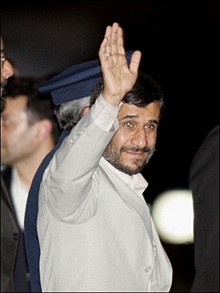 |
 |
 |
 Editorials | Issues | January 2007 Editorials | Issues | January 2007  
US Plans Envision Broad Attack on Iran: Analyst
 Reuters Reuters


| | President Mahmoud Ahmadinejad has vowed that Iran will never bow to UN resolutions over its nuclear programme, as the military prepared for war games that will include short-range missile tests. (AFP/Rodrigo Buendia) |
U.S. contingency planning for military action against Iran's nuclear program goes beyond limited strikes and would effectively unleash a war against the country, a former U.S. intelligence analyst said last week.

"I've seen some of the planning ... You're not talking about a surgical strike," said Wayne White, who was a top Middle East analyst for the State Department's bureau of intelligence and research until March 2005.

"You're talking about a war against Iran" that likely would destabilize the Middle East for years, White told the Middle East Policy Council, a Washington think tank.

"We're not talking about just surgical strikes against an array of targets inside Iran. We're talking about clearing a path to the targets" by taking out much of the Iranian Air Force, Kilo submarines, anti-ship missiles that could target commerce or U.S. warships in the Gulf, and maybe even Iran's ballistic missile capability, White said.

"I'm much more worried about the consequences of a U.S. or Israeli attack against Iran's nuclear infrastructure," which would prompt vigorous Iranian retaliation, he said, than civil war in Iraq, which could be confined to that country.

President George W. Bush has stressed he is seeking a diplomatic solution to the dispute over Iran's nuclear program.

But he has not taken the military option off the table and his recent rhetoric, plus tougher financial sanctions and actions against Iranian involvement in Iraq, has revived talk in Washington about a possible U.S. attack on Iran.

The Bush administration and many of its Gulf allies have expressed growing concern about Iran's rising influence in the region and the prospect of it acquiring a nuclear weapon.

Middle East expert Kenneth Katzman argued "Iran's ascendancy is not only manageable but reversible" if one understands the Islamic republic's many vulnerabilities.

Tehran's leaders have convinced many experts Iran is a great nation verging on "superpower" status, but the country is "very weak ... (and) meets almost no known criteria to be considered a great nation," said Katzman of the Library of Congress' Congressional Research Service.

The economy is mismanaged and "quite primitive," exporting almost nothing except oil, he said.

Also, Iran's oil production capacity is fast declining and in terms of conventional military power, "Iran is a virtual non-entity," Katzman added.

The administration, therefore, should not go out of its way to accommodate Iran because the country is in no position to hurt the United States, and at some point "it might be useful to call that bluff," he said.

But Katzman cautioned against early confrontation with Iran and said if there is a "grand bargain" that meets both countries' interests, that should be pursued. | 
 | |
 |



